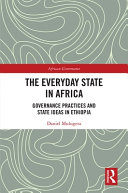
The Everyday State in Africa
By - Mulugeta, Daniel
Floor
-
Floor 1
Published
-
Routledge, Abingdon, Oxon, 2020
ISBN 10 - 0367193809
ISBN 13 - 9780367193805
Book Status
-
1 Qnty Available with us.
Subject
-
Ethiopia Politics and government
Shelf No
-
15
Call Number
-
320.963 MUL
Physical Description
-
1 online resource (x, 190 pages)
Notes
-
Includes index